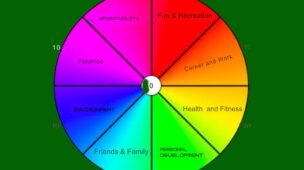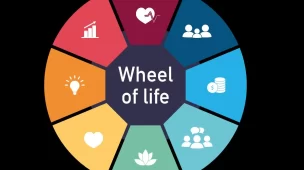Have you ever reached a point in life where you aren’t exactly sure what you want to do? Or you are sure what you want but, again, not really sure “how” to achieve it. It seems like you need to know What is life coaching.
But what is life coaching? Why should you hire a life coach? And is it truly beneficial? There seems to be a lack of clarity surrounding what it is that a life coach can do for you. But we are here to provide that clarity. Read on to have all your life coaching-related questions answered!
The very first question you may ask is, what is life coaching? Simply put, it is a type of coaching that aims to help people meet their personal and professional goals. It is a type of counselling or guidance personalized to your unique self, carried out by a “life coach.”
What is a Life Coach?
A life coach is someone who is professionally trained to help you reach your desired life goals.
Life coaching helps you realize and achieve your full potential, so you are better able to pursue your life goals. This is done through a series of coaching sessions, one on one guidance by your life coach, and by forming personal development strategies.
The goals you may want to pursue are not limited; they can range from your need to improve your health and mental well-being, foster healthy relationships to a desire to get through your career challenges and time management. For every individual, coaching will subjectively help them with THEIR unique needs. Moreover, the type of coaching you receive will vary from one life coach to the next.
What Can A Life Coach Do For You?
A life coach will first help you realize what your goals are. Many individuals struggle to understand what it is they actually want to achieve. This could be relevant to either your personal or professional development.
A life coach helps you clarify these goals.
Once you recognize them, your life coach will help you develop strategies to achieve them. This further involves recognizing any potential obstacles in your way and how you can navigate around them.
What is the Difference Between Life Coaching and Therapy?
Life coaching and therapy are distinct approaches to personal development and mental well-being, each with its unique focus and methods.
Purpose and Focus:
- Life Coaching: Primarily focuses on helping individuals achieve specific personal or professional goals. It is action-oriented, concentrating on the present and future. Life coaches assist clients in identifying their goals, developing strategies to achieve them, and enhancing overall life satisfaction and performance.
- Therapy (Psychotherapy): Focuses on mental health and emotional healing. It is designed to address psychological issues, past traumas, mental disorders, and emotional challenges. Therapists help clients understand and resolve deep-seated issues, improve mental health, and cope with various life challenges.
Approach and Techniques:
- Life Coaching: Utilizes motivational techniques, goal-setting, and accountability strategies. Coaches work with clients to develop practical plans and encourage self-discovery and personal growth.
- Therapy: Involves therapeutic techniques based on psychological theories. Therapists diagnose and treat mental health conditions, using approaches like cognitive-behavioral therapy, psychoanalysis, or counseling.
Training and Qualifications:
- Life Coaches: Typically undergo certification programs focused on coaching skills, goal-setting, and motivational strategies. They are not required to have a degree in psychology or counseling.
- Therapists: Are licensed professionals with degrees in psychology, psychiatry, social work, or counseling. They are trained to diagnose and treat mental health disorders.
Duration and Scope:
- Life Coaching: Generally short-term and goal-specific, focusing on specific areas such as career, relationships, or personal development.
- Therapy: Can be short-term or long-term, depending on the client’s needs. It delves deeper into emotional and psychological issues.
Regulatory Framework:
- Life Coaching: Less regulated than therapy. There is no standardized licensing requirement for life coaches.
- Therapy: Highly regulated. Therapists must be licensed and adhere to strict ethical codes and standards.
In summary, while both life coaching and therapy aim to improve quality of life, they differ significantly in their objectives, approaches, and professional requirements.
Therapy addresses deeper psychological issues, whereas life coaching focuses on goal attainment and personal growth.
Recognizing the need for a life coach can be an important step in personal development. Here are some main signs that you might benefit from life coaching:
1. Feeling Stuck or Directionless: If you’re unsure about your life’s direction or feel stuck in your current situation, a life coach can help clarify your goals and develop a plan to achieve them.
2. Lack of Motivation and Accountability: If you struggle with self-motivation or find it challenging to hold yourself accountable for your goals, a life coach can provide the external motivation and accountability you need.
3. Desire for Personal Growth: If you’re eager to grow personally or professionally but aren’t sure how to proceed, a life coach can guide you in exploring new possibilities and developing your potential.
4. Difficulty Managing Stress or Time: If you find it hard to manage stress or organize your time effectively, a life coach can assist in developing strategies to improve your work-life balance and productivity.
5. Transitional Phases in Life: During significant life changes such as career transitions, moving, or starting a family, a life coach can offer support and guidance to navigate these changes successfully.
6. Improving Relationships: If you’re facing challenges in your personal or professional relationships, a life coach can help you develop better communication skills and strengthen your interpersonal relationships.
7. Seeking a Balanced Life: If you feel that certain areas of your life are overwhelming others, a life coach can help you find a more balanced and fulfilling approach to life.
8. Realizing Unmet Potential: If you believe you’re not living up to your full potential but aren’t sure how to unlock it, a life coach can help identify barriers and develop strategies to overcome them.
9. Overcoming Procrastination: If procrastination is hindering your progress, a life coach can assist in understanding the root causes and developing actionable plans to overcome it.
10. Need for Personalized Guidance: If generic advice isn’t cutting it and you seek personalized guidance tailored to your unique situation, a life coach can provide this individualized attention.
It’s important to note that life coaching is distinct from therapy.
If you’re dealing with deep-seated psychological issues, mental health concerns, or emotional traumas, seeking help from a licensed therapist or counsellor is advisable.
Life coaching is more suitable for those seeking to enhance their life through goal setting, personal development, and strategic planning.
Recommended Books and Audiobooks:
1. Co-Active Coaching: The Proven Framework for Transformative Conversations at Work and in Lifeby Henry Kimsey-House, Karen Kimsey-House, Phillip Sandahl, and Laura Whitworth – This book is a cornerstone in the field of coaching, providing a powerful, collaborative approach that leads to lasting personal and professional change.
2. The Coaching Habit: Say Less, Ask More & Change the Way You Lead Forever by Michael Bungay Stanier – Offers simple, practical tools for adopting more coaching into your daily interactions, making it easier to encourage others to find their solutions.
3. Becoming a Professional Life Coach: Lessons from the Institute of Life Coach Training by Patrick Williams and Diane S. Menendez – This book delves into the psychology, philosophy, and practical aspects of life coaching, offering a comprehensive guide for those looking to make a significant impact in others’ lives.
4. The Life Coaching Handbook: Everything You Need to Be an Effective Life Coach” by Curly Martin – Ideal for anyone starting their coaching journey, this book provides a step-by-step guide to creating and sustaining a successful coaching practice.
5. Change Your Questions, Change Your Life: 12 Powerful Tools for Leadership, Coaching, and Life by Marilee Adams – Focuses on the impact of inquiry and how changing the questions we ask ourselves can dramatically alter the outcomes of our decisions and interactions.
6. Coaching for Performance: GROWing Human Potential and Purpose – The Principles and Practice of Coaching and Leadership by John Whitmore – Introduces the GROW model, a foundational concept in coaching that outlines a clear pathway to enhancing personal and professional development.
7. Dare to Lead: Brave Work. Tough Conversations. Whole Hearts. by Brené Brown – While not exclusively about coaching, this book offers invaluable insights into leadership, vulnerability, and building resilience, all of which are crucial components of effective coaching.
8. The Art of Possibility: Transforming Professional and Personal Life by Rosamund Stone Zander and Benjamin Zander – A transformative book that explores how shifting our perspectives can open up new possibilities in coaching, leadership, and personal growth.
9. Trillion Dollar Coach: The Leadership Playbook of Silicon Valley’s Bill Campbell by Eric Schmidt, Jonathan Rosenberg, and Alan Eagle – Offers lessons from the legendary Silicon Valley coach Bill Campbell, whose coaching approach helped shape some of the biggest tech leaders and companies.
10. Strengths-Based Coaching: How to Identify and Grow Talent for Maximum Success by Gallup – Focuses on leveraging individual strengths rather than fixing weaknesses, providing a positive framework for personal and professional development.










